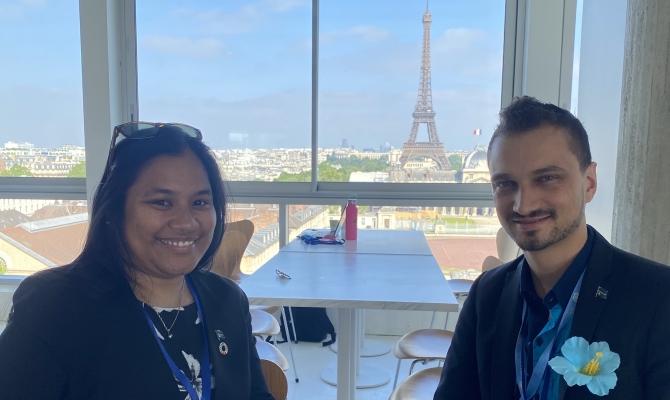Nauru might be a small country with a population of around 10,000 people on a single island in the Pacific Ocean but its voice is loud and clear at the second Session of the Intergovernmental Negotiating Committee to develop an international legally binding instrument on plastic pollution, including in the marine environment (INC-2) in Paris, France.
As negotiators, including delegations from 12 Pacific island countries, continue the work towards a treaty to end plastic pollution at the UNESCO Headquarters, First Secretary Permanent Mission of the Republic of Nauru to the United Nations Office and other international organisations in Geneva, Joanie Hartman, has urged the meeting to think of the big picture.
“At the end of the day, this should not be about money, this is about the people and our future generations,” she said. “The message from Nauru to world leaders and all the negotiators here in Paris is that time is of the essence. The People and the environment should be at the heart of this treaty and therefore, let us put aside our differences, political and self-motivated agenda and the want to make more money, but really consider what is at stake.
“We are talking about the future of humanity, where our Pacific communities who are at the forefront of this plastic crisis, have been badly impacted by something they did not create.”
Since Monday last week, Hartman and Pacific delegations have been burning the midnight oil, in different meetings as countries and regional groups respond to options in an “elements paper” including possible objectives, core obligations, control measures, voluntary and/or legally binding approaches, implementation measures, and means of implementation.
The first session of the Intergovernmental Negotiating Committee (INC-1) to develop the instrument was held in Uruguay last year. The meeting taking place in Paris this week (INC-2) is the second of five INCs. As a first time negotiator, Hartman said it has been heartening to be part of the One Pacific voice during the negotiations.
“The negotiations can be quite overwhelming especially with the many late nights we’ve had where we’ve been finishing after midnight but I think the feeling amongst all Pacific delegates is that we are here to represent our countries and communities who are impacted by plastic pollution,” she said.
“The big picture here is that we have one goal and that is to reach a treaty to end plastic pollution.”
For Nauru, one of the challenges of addressing plastic pollution is the disposing of plastic waste.
“We only have one landfill and this is where all the plastics end up. The government is promoting the use of traditional ways to dispose and clean up these plastics and has encouraged community engagement to assist with the collection of plastic waste on land and in our oceans,” she said.
“While we also have laws that ban the use of single use plastic, we feel more needs to be done.
“Under this new treaty being discussed, we are hoping to receive technical and financial assistance, as well as help from the international community and partners to build the capacity of our communities to dispose and clean up the waste and reach the goal in end plastic pollution.”
A plastics treaty is very important for Nauru, she said, given their special relationship with the ocean.
“At the end of the day, like our PSIDS Chair said, we are custodians of the ocean, we depend and live off the ocean, and we have a responsibility to look after the ocean not only for us but to ensure that our children and future generations will inherit a safe and healthy marine environment,” she said.
The UN Environment Programme (UNEP) projects that the amount of plastic waste entering aquatic ecosystems could reach some 23 to 37 million tonnes per year by 2040.
Speaking during the opening last Monday, UNEP Chief, Inger Andersen bluntly stated that “we cannot recycle our way out of this mess”, adding that “only elimination, reduction, a full life-cycle approach, transparency and a just transition can bring success.”
Hartman agrees and she believes the process needs to move a lot faster.
“In Nauru our resources have already been exhausted by the threat of climate change, biodiversity loss, COVID-19 and now this plastic pollution crisis,” she said. “We cannot continue to take the plastic waste that is washed into our country from other regions and suffer health, environment, economic and social consequences for something we did not cause. This is why for us in Nauru, we need this treaty and we need it now.”
The second meeting of the Intergovernmental Negotiating Committee on Plastic Pollution (INC-2) ends on Friday, and delegates have a deadline to agree to a treaty by 2024.
SOURCE: SPREP/PACNEWS













